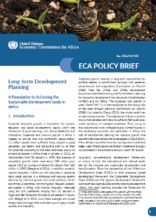Long-term Development Planning

Sustained economic growth, a foundation for poverty reduction and social development, occurs within the framework of good planning, with strong leadership and institutions. Sustained and inclusive growth in Africa is needed to ensure that the continent’s approximately 1.1 billion people have sufficient food, acquire a good education, are healthy and productive and live to their full potential. According to the latest estimates, about 43 percent of people in Africa lived in poverty in 2012, an improvement from 56 percent in 1990. But because of population growth, there were about 389 million poor people 2012 (an increase of almost 40 percent from 280 million in 1990) (Beegle et al 2016). In addition, endemic income inequality in Africa as well inequities in access to basic social services is a challenge and requires careful planning for inclusive growth and social cohesion. Seven out of the 10 countries with the highest inequality globally are located in Africa, with income inequality, measured using the Gini coefficient, ranging from 31 percent in Niger and São Tomé and Príncipe to 63 percent in South, with (Beegle et al 2016). And these averages and broad ranges mask the large intra- and inter-country gaps in both poverty and inequality.